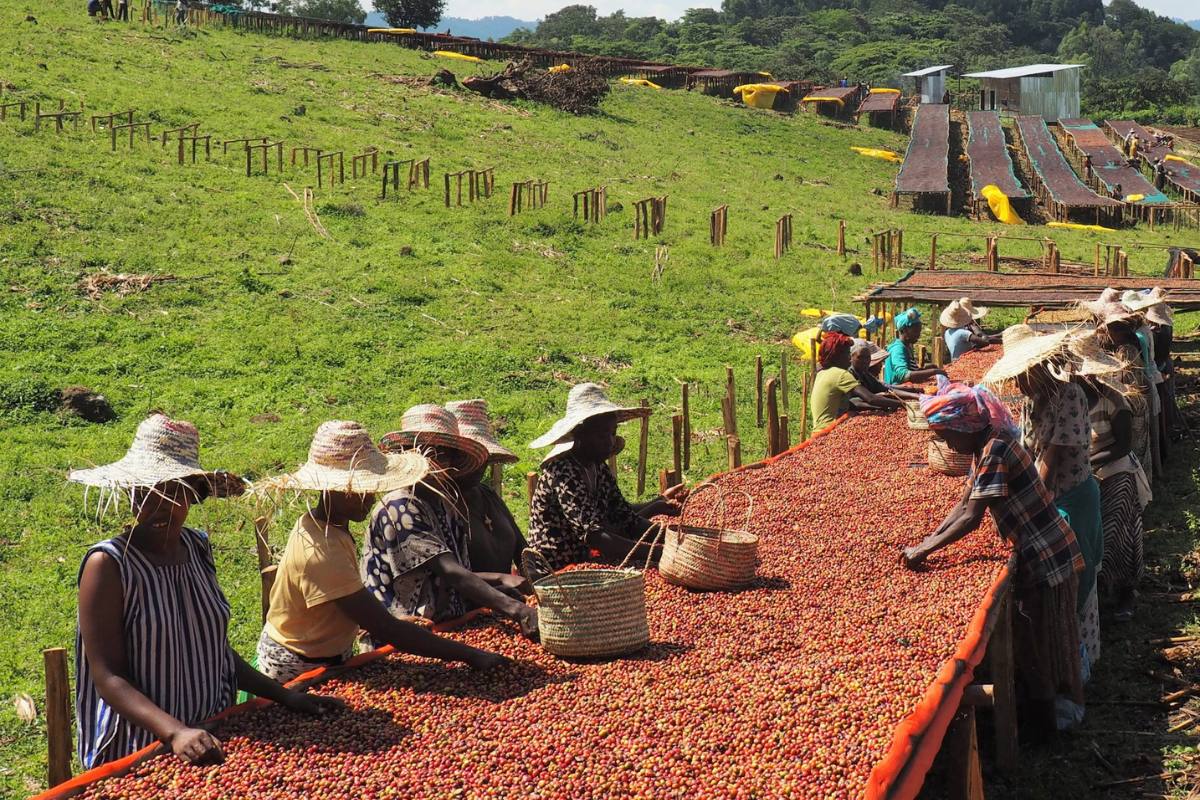Ethiopia is widely regarded as the birthplace of coffee, both culturally and botanically. More than just a commodity, coffee is deeply woven into Ethiopian society, rituals, and economy. Exploring Ethiopian coffee is like taking a journey into the roots of coffee itself — where wild coffee still grows naturally in forests and unique flavors are celebrated around the world.
A Brief History of Coffee in Ethiopia
The story of coffee’s discovery begins with the famous legend of Kaldi, a goat herder who noticed his goats becoming energetic after eating red cherries from a certain tree. This tree was the Coffea arabica, and from Ethiopia, coffee would eventually spread across the world.
Ethiopians have been consuming coffee since at least the 9th century, both as a beverage and as part of community rituals. Unlike many producing countries, Ethiopia also consumes a large portion of its own coffee domestically.
Ethiopia’s Unique Coffee Growing Landscape
Ethiopia’s coffee-growing conditions are unique and ideal:
- High altitudes between 1,500 to 2,200 meters
- Rich volcanic soils
- Abundant rainfall and biodiversity
- Coffees are often grown under the shade of native forest trees
Types of Coffee Farming in Ethiopia:
- Forest Coffee: Wild coffee harvested from natural forests.
- Semi-Forest Coffee: Managed forest coffee, where farmers tend to wild coffee trees.
- Garden Coffee: Small plots around homes, common in rural areas.
- Plantation Coffee: Larger farms, though less common than smallholder plots.
Main Coffee Growing Regions in Ethiopia
- Yirgacheffe:
- Flavor: Floral, citrus, tea-like, with bright acidity
- Process: Mostly washed
- Sidamo:
- Flavor: Balanced with citrus, chocolate, and floral notes
- Process: Both washed and natural
- Harrar:
- Flavor: Wild, fruity, wine-like with blueberry and chocolate notes
- Process: Mostly natural
- Limu:
- Flavor: Mild, sweet, with balanced acidity and floral hints
- Process: Mainly washed
- Guji:
- Flavor: Complex, fruity, sometimes tropical with delicate acidity
- Process: Both washed and natural
The Ethiopian Coffee Ceremony
One of the most beautiful aspects of Ethiopian coffee culture is the traditional coffee ceremony, which is a daily social ritual that can last several hours.
Steps in the Ceremony:
- Roasting: Raw green beans are roasted over an open flame.
- Grinding: Freshly roasted beans are ground with a mortar and pestle.
- Brewing: Coffee is brewed in a Jebena, a traditional clay pot.
- Serving: Served in small cups, often with popcorn or bread on the side.
This ceremony represents hospitality, respect, and community bonding.
Processing Methods in Ethiopia
- Washed Process: Common in Yirgacheffe and Sidamo, producing clean, floral, and bright coffees.
- Natural Process: Especially in Harrar, resulting in fruity, wine-like, heavy-bodied cups.
Flavor Profiles of Ethiopian Coffee
- Bright acidity with citrus or lemon
- Floral notes like jasmine and bergamot
- Fruity tones, ranging from berries to tropical fruits
- Often with tea-like body and incredible clarity
The Genetic Treasure of Ethiopian Coffee
One of the most fascinating things about Ethiopian coffee is its unparalleled genetic diversity. Ethiopia is home to thousands of wild coffee varietals that don’t exist anywhere else on Earth. This vast genetic pool contributes to the country’s incredible range of flavors, aromas, and textures. Unlike most countries that rely on a handful of commercial varietals, Ethiopian farmers often cultivate heirloom varieties passed down for generations. This natural biodiversity not only supports flavor complexity but also offers resilience against pests, diseases, and climate change — making Ethiopian coffee both delicious and sustainable in the long term.
Why Ethiopian Coffee Is So Unique
- Genetic diversity: Ethiopia has thousands of coffee varietals not found anywhere else.
- Traditional cultivation: Much coffee is grown organically in biodiverse environments.
- Cultural connection: Coffee is an integral part of Ethiopian identity and daily life.
Conclusion: A Journey into the Heart of Coffee
Ethiopian coffee is more than just a beverage — it’s a symbol of heritage, culture, and natural beauty. From the highland farms of Yirgacheffe to the wild forests of Harrar, every cup tells a story of centuries-old traditions and unmatched flavor diversity. Experiencing Ethiopian coffee is like tasting the very origins of coffee itself.
